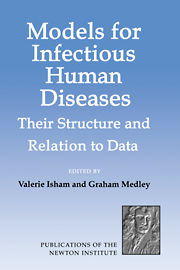Book contents
- Frontmatter
- Contents
- Introduction
- Participants
- Non-Participant Contributors
- Part 1 Transmissible diseases with long development times and vaccination strategies
- Overview of data analysis: diseases with long development times
- HPV and cervical cancer
- An age-structured model for measles vaccination
- Invited Discussion
- Invited Discussion
- Piece-wise constant models to estimate age- and time-specific incidence of toxoplasmosis from age- and time-specific seroprevalence data
- New methodology for AIDS back calculation
- Imperfect HIV vaccines, the consequences for epidemic control and clinical trials
- Feasibility of prophylactic HIV-vaccine trials: some statistical issues
- The design of immunisation programmes against hepatitis B virus in developing countries
- The effect of different mixing patterns on vaccination programs
- Optimal vaccination patterns in age-structured populations I: the reproduction number
- Optimal vaccination patterns in age-structured populations II: optimal strategies
- Part 2 Dynamics of immunity (development of disease within individuals)
- Part 3 Population heterogeneity (mixing)
- Part 4 Consequences of treatment interventions
- Part 5 Prediction
Invited Discussion
Published online by Cambridge University Press: 04 August 2010
- Frontmatter
- Contents
- Introduction
- Participants
- Non-Participant Contributors
- Part 1 Transmissible diseases with long development times and vaccination strategies
- Overview of data analysis: diseases with long development times
- HPV and cervical cancer
- An age-structured model for measles vaccination
- Invited Discussion
- Invited Discussion
- Piece-wise constant models to estimate age- and time-specific incidence of toxoplasmosis from age- and time-specific seroprevalence data
- New methodology for AIDS back calculation
- Imperfect HIV vaccines, the consequences for epidemic control and clinical trials
- Feasibility of prophylactic HIV-vaccine trials: some statistical issues
- The design of immunisation programmes against hepatitis B virus in developing countries
- The effect of different mixing patterns on vaccination programs
- Optimal vaccination patterns in age-structured populations I: the reproduction number
- Optimal vaccination patterns in age-structured populations II: optimal strategies
- Part 2 Dynamics of immunity (development of disease within individuals)
- Part 3 Population heterogeneity (mixing)
- Part 4 Consequences of treatment interventions
- Part 5 Prediction
Summary
In the first session of this conference, we have heard three very different papers on three very interesting topics. I wish, however, to claim the prerogative granted to me by the organizers to comment in detail on the paper by Dr. Gore and to make only brief reference to the other papers. This approach is primarily motivated by the prior availability of Dr, Gore's manuscript and is no reflection on the other presentations.
Dr. Gore has provided an impressive survey of data analysis methods which have been employed for the study of a variety of diseases with long development times. In my comments, I hope to elaborate on some of the issues raised rather than to offer specific criticisms.
Time to event regression models have played a major role in the analysis of longitudinal data. Dr. Gore has placed some stress on the need for further consideration of the covariate codings in such models, in particular with respect to HIV disease. I have five comments on this issue.
(1) When using time dependent variables, it is almost essential that lagged covariates be used. It is unlikely that, for example, interest is directed towards the predictive role of CD4 counts at the time of AIDS diagnosis. In an analysis of the Toronto Sexual Contact Cohort (TSCC) data (Coates et al. 1992), we adopted the approach of lagging immunological markers by one year so that the developed models used covariates of the form X(t – 1) rather than X(t). The need for this is sometimes not recognized because covariates are not updated continuously and therefore an effective lagging takes place because the last available measurement is used in the regression models.
- Type
- Chapter
- Information
- Models for Infectious Human DiseasesTheir Structure and Relation to Data, pp. 57 - 61Publisher: Cambridge University PressPrint publication year: 1996

